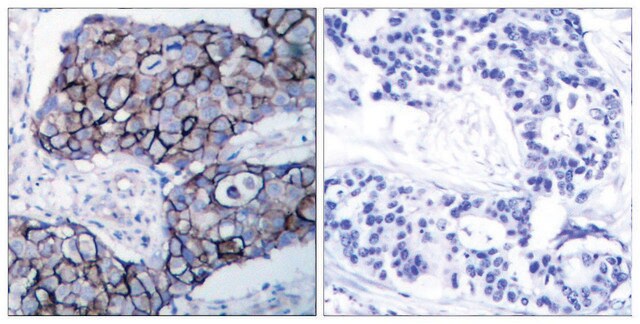MAB1976H
Anti-Integrin αVβ3 Antibody, clone LM609, Phycoerythrin conjugated
clone LM609, Chemicon®, from mouse
Sinonimo/i:
Vitronectin Receptor, CD51/CD61
About This Item
Prodotti consigliati
Origine biologica
mouse
Livello qualitativo
Coniugato
PE
Forma dell’anticorpo
purified immunoglobulin
Tipo di anticorpo
primary antibodies
Clone
LM609, monoclonal
Reattività contro le specie
monkey, pig, rabbit, bovine, avian, chicken, canine, human
Non deve reagire con
mouse, rat
Produttore/marchio commerciale
Chemicon®
tecniche
flow cytometry: suitable
immunohistochemistry: suitable
Isotipo
IgG1
N° accesso NCBI
N° accesso UniProt
Condizioni di spedizione
wet ice
modifica post-traduzionali bersaglio
unmodified
Informazioni sul gene
human ... ITGAV(3685)
Descrizione generale
580 nm
Specificità
ABSORPTION MAXIMA: 90 nm, 545 nm and 565 nm
Immunogeno
Applicazioni
Immunofluorescence: 5-10 μg/mL for staining of bFGF-treated 6 mm cryosections of chick chorioallantoic membrane fixed with acetone (Brooks, 1994). LM609 is also effective on 4% paraformaldehyde fixed, frozen tissues and cells. However it is not effective for immunohistochemical staining of paraffin-embedded tissue sections.
Optimal working dilutions and protocols must be determined by end user.
Cell Structure
Integrins
Stato fisico
Stoccaggio e stabilità
Risultati analitici
POSITIVE CONTROL: Human myeloma cell lines M21 and MoalphaV (Chen, 1995).
NEGATIVE CONTROL: Mo cells (this cell line was derived from M21 but does not express integrin alphaV; Chen, 1995).
Altre note
Note legali
Esclusione di responsabilità
Non trovi il prodotto giusto?
Prova il nostro Motore di ricerca dei prodotti.
Codice della classe di stoccaggio
12 - Non Combustible Liquids
Classe di pericolosità dell'acqua (WGK)
WGK 2
Punto d’infiammabilità (°F)
Not applicable
Punto d’infiammabilità (°C)
Not applicable
Certificati d'analisi (COA)
Cerca il Certificati d'analisi (COA) digitando il numero di lotto/batch corrispondente. I numeri di lotto o di batch sono stampati sull'etichetta dei prodotti dopo la parola ‘Lotto’ o ‘Batch’.
Possiedi già questo prodotto?
I documenti relativi ai prodotti acquistati recentemente sono disponibili nell’Archivio dei documenti.
Il team dei nostri ricercatori vanta grande esperienza in tutte le aree della ricerca quali Life Science, scienza dei materiali, sintesi chimica, cromatografia, discipline analitiche, ecc..
Contatta l'Assistenza Tecnica.